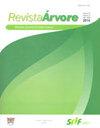评价价格、汇兑和数量对巴西木材产品出口收入增长的影响
IF 0.8
4区 农林科学
Q4 FORESTRY
引用次数: 0
摘要
在过去的十年里,巴西的木材出口量有所增长,但却未能提高木材产品的价格。本研究旨在帮助理解这种矛盾的情况,评估巴西在2011-2015年和2016-2020年两个时期出口这些产品的收入增长,并分解其对价格、汇率和数量的影响。所采用的方法是转移份额,广泛用于确定部门和区域经济增长的决定因素,是分析森林部门出口方法的先驱。根据经济部的出口数据,对5(五)类木制品的历史序列进行了分析。本文采用了应用经济研究所(IPEA)的名义汇率历史序列。实际有效汇率(RER)遵循国际经济评估的方法说明。在这两个时期,所分析的所有产品类别在数量方面都有积极影响,第二个时期受汇率推动的比例更大,尽管实际价格有所损失,未能抵消通货膨胀。唯一的例外是木材制造商,这是一种附加值较高的产品,在数量、汇率和价格上都有所增长。就对国家和国际前景的不同影响而言,数量影响是最相关的,其次是汇率,因为美元对雷亚尔对汇率的升值,以及通货膨胀的控制。价格对出口收入的影响为负,在此期间有所下降。除了出口产品的附加值之外,世界库存和消费水平也可能对这种情况产生不利影响,影响到所有类别的出口产品,但制造的木制品除外,这是唯一没有反映出这种理由的类别。本文章由计算机程序翻译,如有差异,请以英文原文为准。
EVALUATION OF THE EFFECTS OF PRICE, EXCHANGE, AND VOLUME ON THE GROWTH OF REVENUES FROM BRAZILIAN EXPORTS OF WOOD PRODUCTS
ABSTRACT Brazil has advanced in export volume but has not been able to increase prices over the last decade for wood products. This work seeks to contribute to the understanding of this conflicting scenario, evaluating the growth in the revenue of Brazilian exports of these products during two periods: 2011-2015 and 2016-2020, as well as decomposing its effects in price, exchange rate, and volume. The method applied was the shift-share, widely used to identify determinants of sectoral and regional economic growth, being a precursor to the approach in the analysis of forest sector exports. Historical series for 5 (five) categories of wood products were analyzed, with export data from the Ministry of Economy. The historical series of nominal exchange rates from the Institute of Applied Economic Research (IPEA) was used. The real effective exchange rate (RER) followed the methodological note of the IPEA. All product categories analyzed had positive effects in terms of volume, for both periods, with a greater proportion in the second being driven by the exchange rate, although with a loss in real price, failing to offset inflation. The only exception was wood manufacturers, a product with higher added value, which presented gains in volume, exchange rates, and price. The volume effect was the most relevant, followed by the exchange rate as a result of the appreciation of the dollar against the real against the exchange rate and control of inflation in terms of the divergent effects on the national and international scenario. The price presented negative variations in export revenue, with a decline over the period. In addition to the added value of exported products, world stocks and levels of consumption may have contributed negatively to this scenario, affecting all categories of exported products, except for manufactured wood products, the only category that did not reflect such justifications.
求助全文
通过发布文献求助,成功后即可免费获取论文全文。
去求助
来源期刊

Revista Arvore
FORESTRY-
CiteScore
1.00
自引率
0.00%
发文量
32
审稿时长
4-8 weeks
期刊介绍:
A Revista Árvore é um veículo de comunicação científica da Sociedade de Investigações Florestais – SIF. O jornal é de acesso gratuito, revisado por pares, que publica bimestralmente trabalhos científicos originais no campo da Ciência Florestal. As áreas temáticas para publicação são: Ambiência e Conservação da Natureza, Manejo Florestal, Silvicultura e Tecnologia da Madeira e Utilização de Produtos Florestais.
A política editorial visa manter alta conduta ética em relação à publicação e aos seus funcionários, rigor na qualidade dos artigos científicos, seleção de revisores qualificados, respeito profissional aos autores e processo de tomada de decisão imparcial. A Revista Árvore publica artigos apenas em inglês.
Artigos de revisão podem ser publicados se houver uma discussão relevante resumindo o estado da arte sobre o assunto. A revisão estrita da literatura não é aceita.
 求助内容:
求助内容: 应助结果提醒方式:
应助结果提醒方式:


